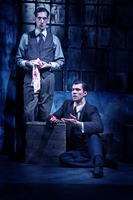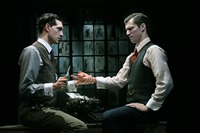By Ruth Ross

Called "The Crime of the Century," the 1924 cold-blooded murder of 14-year-old Bobby Franks by two rich, spoiled teenage geniuses in Chicago stunned the entire nation with its seeming senselessness and depravity. While such a lurid tale might seem inappropriate for musical treatment, playwright/composer/lyricist Stephen Dolginoff has penned a two-character "pocket musical," Thrill Me: The Leopold and Loeb Story, that provides a disturbing glimpse into the minds of the two perpetrators and, as Neil Genzlinger of the New York Times put it, "lands like a well-placed punch, arresting and a bit breathtaking." A 2005 Drama Desk Award Nominee for Best Musical and Best Musical Score, Thrill Me, receiving its New Jersey professional premiere at Luna Stage, is horrific, chillingly intense and, well, thrilling.
 Under the taut direction of Artistic Director Cheryl Katz, Dolginoff's story is recounted through dialogue and musical numbers that are "sung through" to reveal the inner states of the two killers and their strange personal relationship. Accompanied by Musical Director Andy Peterson's driving piano, Joe Bigelow (Nathan Leopold; seated) and Dean Linnard (Richard Loeb; standing) take us on a rollercoaster ride of wild emotion, unrelieved yearning and mind-boggling thrill-seeking over the course of 90 intermissionless minutes.
Under the taut direction of Artistic Director Cheryl Katz, Dolginoff's story is recounted through dialogue and musical numbers that are "sung through" to reveal the inner states of the two killers and their strange personal relationship. Accompanied by Musical Director Andy Peterson's driving piano, Joe Bigelow (Nathan Leopold; seated) and Dean Linnard (Richard Loeb; standing) take us on a rollercoaster ride of wild emotion, unrelieved yearning and mind-boggling thrill-seeking over the course of 90 intermissionless minutes.
If you've never heard of this sensational murder case, here are the facts: Nathan Leopold and Richard Loeb, adolescent geniuses (Leopold's IQ was reputed to be 210) and long-time friends, are convinced that they are Super Men (uber menschen) as described by the German philosopher, Friedrich Nietzsche—superior human beings who could commit the perfect crime and get away with it. Graduating from high school at 15½, from college at 18 and finishing the first year of law school by 19 (Leopold at Harvard; Loeb at the University of Chicago), the two were clearly intellectually head and shoulders above the usual teenager of the time. To boot, they came from wealthy families and could be considered spoiled, although Loeb's relations with his distant, prestige-seeking father were troubled.
 While we never know really why the two committed such a heinous crime, in Thrill Me, Dolginoff provides some plausible answers. In this iteration, Loeb (Linnard, left) is the dominant one, using cruelty to finagle Leopold to go along with his psychopathic thrill-seeking in return for fulfilling his friend's homosexual needs. In these escapades, Leopold (Bigelow, right) appears to be the more moral of the two, reluctantly going along with arson, then burglary and vandalism, but balking a bit at murder. That he gives in rather easily speaks to Loeb's sexual hold on him, taking advantage of his love and neediness. Interestingly, the playwright provides a chilling, yet unexpected, twist at the end that will have you questioning what you've seen before and talking about it after you leave the theater.
While we never know really why the two committed such a heinous crime, in Thrill Me, Dolginoff provides some plausible answers. In this iteration, Loeb (Linnard, left) is the dominant one, using cruelty to finagle Leopold to go along with his psychopathic thrill-seeking in return for fulfilling his friend's homosexual needs. In these escapades, Leopold (Bigelow, right) appears to be the more moral of the two, reluctantly going along with arson, then burglary and vandalism, but balking a bit at murder. That he gives in rather easily speaks to Loeb's sexual hold on him, taking advantage of his love and neediness. Interestingly, the playwright provides a chilling, yet unexpected, twist at the end that will have you questioning what you've seen before and talking about it after you leave the theater.
Avoiding psychobabble, Dolginoff's lean version of the crime matches the sparse set designed by Brian Didkiewicz and lit—atmospherically and often eerily—by Jorge Arroyo. And Deborah Caney has attired the two actors in well-tailored three-piece suits appropriate to their station in life and the historical period. Bigelow and Linnard both sing beautifully; their close harmonizing reminds us of their relationship (obsession) and reinforces the play's idea that evil sometimes lurks in beauty. You won't come out humming the melodies, but several are quite striking. "Nothing Like a Fire" seethes with passion and sexual tension; "Roadster" lays out the plan to abduct Bobby Franks, "Ransom Note" vocally takes us through the plan to extort $10,000 from Frank's father, and in "I'm Trying to Think," Loeb helps Leopold concoct an alibi to throw the cops off the duo's scent after Leopold has dropped his glasses at the burial site. All of this is delivered as musical dialogue with a hint of Sondheim.
Bigelow's portrayal of Leopold does much to humanize the character as he struggles to win Loeb's often withheld love and approval. He's immature, eager to please and is easily led. Linnard's Loeb has a maniacal glint in his eye; his calculated charm, smirks and overt narcissism are malevolent, but Dolginoff's lyrics give him some room for dark humor, which he delivers with understatement.
One of the most satisfying aspect of Thrill Me is Dolginoff's refusal to exploit the homosexual aspect of their relationship; he shuns titillation and presents the gay attraction Defense attorney Clarence Darrow so wisely kept out of court (and the papers), to focus on the domination, manipulation and sexual pleasure to explain the why of this cold-blooded crime.
Spared the death penalty, Leopold and Loeb both served time in Joliet Prison. In 1958, after 34 years of imprisonment, Leopold was paroled (the state needed the room and didn't want to spend any more money on a model prisoner); Loeb was killed earlier in a knife fight.
Prior to Leopold's release, Meyer Levin wrote a fictionalized novel, Compulsion, that was made into a major motion picture in 1959. Both are interesting takes on the Crime of the Century, but the electric erotic energy and melancholy of Stephen Dolginoff's Thrill Me—as superbly produced by Luna Stage—provide a captivating glimpse into the morbid psychology of the teenage killers, as well as a very satisfying theatrical experience. An off-beat, edgy musical, it is one you won't want to miss.
Thrill Me: The Leopold and Loeb Story will be performed through December 20 at Luna Stage, 555 Valley Road, West Orange. Talkbacks will be held on Sunday, December 6; Thursday, December 17; and Friday, December 18. Performances are Fridays and Saturdays at 8 PM and Sundays at 3 PM. For information and tickets, call the box office at 973.395.5551 or visit www.LunaStage.org online.
NOTE: For additional insight into the production, check out Luna Stage's Context Room (open 1 hour before the show and 30 minutes after), attend a preshow talk (45 minutes before curtain) or stay for special events after the performance. Click Here for more information.